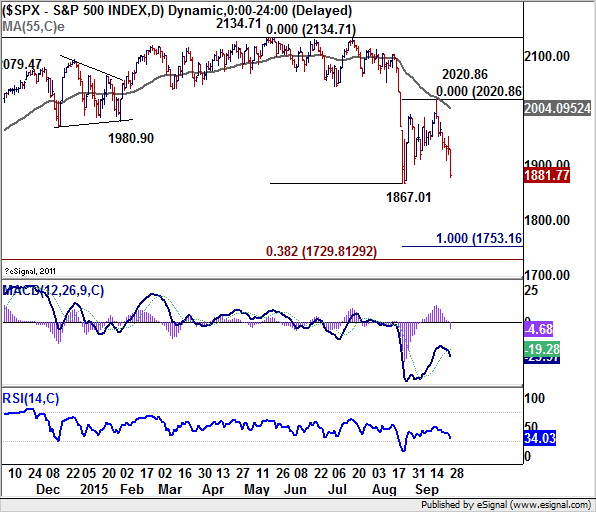The financial markets are haunted by another round of risk selloff. DJIA lost -312.78 pts, or -1.92% to close at 16001.89. It barely held on to 16000 handle after dipping to as low as 15981.85. S&P 500 also lost -49.57 pts, or -2.57% to close at 1881.77. Asian markets followed with Nikkei trading down -660 pts, or -3.7% at the time of writing, and says pressured below 17000 handle. Hong Kong HSI is trading down -660 pts too, or -3.1%. Gold continues to stay soft and is trading at around 1125 in spite of risk adverse sentiments. Crude oil, nonetheless, remains in recently established tight range. In the currency markets, yen is so far the strongest major currency this week, as it usually does in risk aversion. Commodity currencies are generally pressured.
Yesterday's downside acceleration in S&P 500 suggests that fall from 2134.71 is likely resuming. 2134.71 is viewed as a medium term top and fall from there is correcting the long term up trend. Focus will now be back on 1867.01 support this week. Break will confirm this bearish case and target 100% projection of 2134.71 to 1867.01 from 2020.86 at 1753.16. Or, it could go further to 38.2% retracement of 1074.77 to 2134.71 at 1729.81. Such development would cool down the expectation of rate hike from Fed this year and give some pressure to the greenback. Nonetheless, commodity currencies would stay most pressured in risk aversion. And sterling should benefit much as delay in Fed hike also means delay in BoE hike. So, if stock decline extends, Euro and Yen would likely be most benefited.

In US, Chicago Fed president Charles Evans said that "before raising rates, I would like to have more confidence than I do today that inflation is indeed beginning to head higher." And, "it could well be the middle of next year before the headwinds from lower energy prices and the stronger dollar dissipate enough so that we begin to see some sustained upward movement in core inflation". On the other hand, New York Fed President William Dudley noted that the Fed is still on track to increase interest rates in this year. He, however, stressed that the decision would be depend on the health of US economy and financial conditions, as well as global economic development. In a similar vein, San Francisco Fed President John Williams reiterated that a rate hike this year is appropriate. He also warned of the sharp rises in house prices, noting that he’s "starting to see signs of imbalances emerge in the form of high asset prices, especially in real estate, and that trips the alert system".
On the data front, UK mortgage approvals, CBI reported sales, German CPI and Eurozone confidence indicators will be released in European session. Canada will release IPPI and RMPI later today. US will release S&P house price and consumer confidence.
